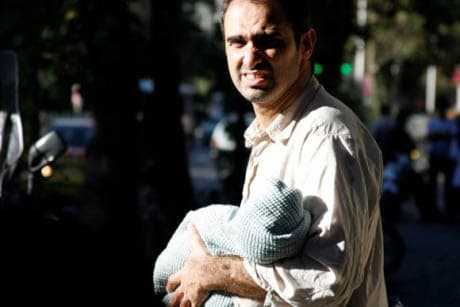Shot in 18 days on digital video to avoid obtaining the necessary permits, occasionally providing a false film synopsis to gain permission to shoot on location, Tehroun is one of the more risqué and edgy titles to come from Iran as of late. This urgency and anxiety translate into a film that, while flawed, captures the cynicism and impenitence of a city fraught with political malfeasance and amoral self-sufficiency.
The title, which is slang for Tehran, referring to the seedier aspects of the asphalt metropolis, also infers the reality that Ibrahim (Ali Ebdali) encounters, having left his family in the country to find work in the city. Unable to find anything legitimate, he rents a baby from a trafficker for commiserative purposes when begging for money.
Repetition, quotidian banality and a vérité aesthetic imply slice-of-life realism with polemical intent. But after Ibrahim leaves the baby with his friend Madjid (Missagh Zareh) and it's kidnapped by a prostitute, things quickly shift to tragic thriller, building intensity via a compounding series of misfortunes and poor judgments.
This descent into martyrdom is what makes this bitter political parable memorable, mixing a realist aesthetic with mafia encounters, back alley threats and drug smuggling. Even though some of the coverage looks incomplete and the acting occasionally rings of awkward high school play, the vehemence of these latter sequences is undeniable.
Where the overall effectiveness wanes, however, is in identification and empathy, given Ibrahim's seeming indifference to his actions, blaming it on society, violently harassing anyone necessary to resolve his plight. The introduction of his somewhat more affable, pregnant wife Zahra (Sara Bahrami) helps, especially considering that Bahrami is a substantially better actor than everyone else, but it comes across as incidental, as she's merely a passive extension of her husband.
Aside from these minor imbalances and some moral ambiguity, Tehroun delivers its intended discomfort in a thoroughly engrossing manner, communicating its timely point of hierarchical rage.
(D Films)The title, which is slang for Tehran, referring to the seedier aspects of the asphalt metropolis, also infers the reality that Ibrahim (Ali Ebdali) encounters, having left his family in the country to find work in the city. Unable to find anything legitimate, he rents a baby from a trafficker for commiserative purposes when begging for money.
Repetition, quotidian banality and a vérité aesthetic imply slice-of-life realism with polemical intent. But after Ibrahim leaves the baby with his friend Madjid (Missagh Zareh) and it's kidnapped by a prostitute, things quickly shift to tragic thriller, building intensity via a compounding series of misfortunes and poor judgments.
This descent into martyrdom is what makes this bitter political parable memorable, mixing a realist aesthetic with mafia encounters, back alley threats and drug smuggling. Even though some of the coverage looks incomplete and the acting occasionally rings of awkward high school play, the vehemence of these latter sequences is undeniable.
Where the overall effectiveness wanes, however, is in identification and empathy, given Ibrahim's seeming indifference to his actions, blaming it on society, violently harassing anyone necessary to resolve his plight. The introduction of his somewhat more affable, pregnant wife Zahra (Sara Bahrami) helps, especially considering that Bahrami is a substantially better actor than everyone else, but it comes across as incidental, as she's merely a passive extension of her husband.
Aside from these minor imbalances and some moral ambiguity, Tehroun delivers its intended discomfort in a thoroughly engrossing manner, communicating its timely point of hierarchical rage.




